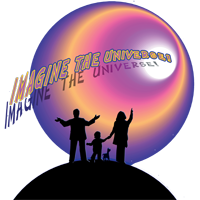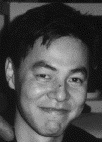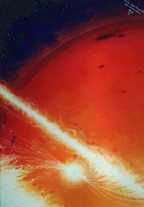Dr. Koji Mukai
Biography
Dr. Koji Mukai was born in Osaka, Japan in 1960 and grew up in that area of Japan. He was interested in physical sciences and astronomy from an early age - in part because of the influence of his brother, 5 years his senior, and the several issues of the magazine "Sai-en-su", the Japanese version of "Scientific American", that his brother lent him.
Dr. Mukai attended the University of Tokyo and obtained a Rigakushi (B.Sc.) degree in from the Department of Physics in 1983. Initially, he tried to get into a prestigious Japanese graduate school and didn't get in! At that point he had the choice of spending an extra year as an undergrad or finding a graduate school overseas. After researching British Universities, Oxford looked good (and is one of the few well known to ordinary folks in Japan). Oxford wanted him and the rest is history. He moved to Oxford, U.K. and studied with Dr. Phil Charles at the Department of Astrophysics; his research was on optical observations of X-ray emitting cataclysmic variables. He earned his D.Phil (that's what Ph.D.s are called at Oxford) in 1986.
After graduate school, Koji worked 3 more years in England before moving to the US. He went first to the Center for EUV Astrophysics in Berkeley, California, where he worked for the EUVE project. Moving on to higher energies (X-rays), he joined the ASCAGuest Observer Facility at Goddard Space Flight Center in January, 1992, working as a contractor for Universities Science Research Associates (USRA) . Since ASCA is a Japan-US collaboration, his ability to communicate in Japanese and in English is often as relied upon as his research experiences.
What does it mean to be a USRA contractor at NASA's Goddard Space Flight Center?
Koji is interested in the question of the space density of cataclysmic variables, or 'how many CVs are there out there?'. Since being at Goddard he has also started making optical observations that have direct relevance to the space density of CVs. One of the first projects he did at Goddard was to look at archival EXOSAT data on CVs, with an aim of trying to estimate how much contributions distant CVs will make to the 'diffuse' X-ray emission seen throughout our Galaxy.
Dr. Mukai has traveled all over the work to make his observations at optical telescopes, including Australia, the Canary Islands, South Africa, and Hawaii. Dr. Mukai has also done observations with ultraviolet and X-ray satellites, including IUE, EXOSAT, Ginga, ROSAT, ASCA, and XTE.
Koji feels at home in Japan, the UK, and the USA. He believes that Japan is changing, for better (becoming fairer to women and minorities) and for worse (more McDonald's). However, Japanese cities are still far too crowded for his taste ("What would Japan be like, if all the Japanese were like you, Koji?" "Empty").
On a Typical Day at Work...
"I spend a lot of time troubleshooting --- responding to questions from a guest observer, testing and debugging software, that kind of thing. With so many of these tasks to attend to, it's sometimes hard to concentrate on a single problem for any length of time, which is necessary to carry out my own research."
On a Typical Weekend Day...
In his private life, Dr. Mukai plays the piano (classical - from Beethoven to Prokofiev), reads a lot (including science fiction and murder mysteries), rides his bicycle to keep himself fit (except in winter), and enjoys watching baseball (particularly the minor league Bowie Baysox).
Questions and Answers
Q: Why did you choose to study astrophysics, rather than some other branch of physics?
A: I chose it because of the way that research is done in astrophysics and because to me how the research is done is as important as what research is done. I consider myself temperamentally unsuited to be a pure theorist, but only average when it comes to hardware. Observational astrophysics involves a lot of data analysis and interpretation, not a lot of building satellites, and looked good for those reasons. I also did not want to be part of a huge team, like experimental particle physicists tend to be nowadays, when hundreds of scientists are listed as authors on one paper.
Another aspect of astrophysics that I like is finding connections, particularly unlikely ones, between different subdisciplines within the field. For example, I often ask myself such questions as "does this class of stars tell me anything about the cosmic distance scale? or about nuclear physics? or the history of the solar system?" What excites me the most is coming up with a new question that nobody has thought to ask, or that everyone has given up on. This, to me, is the essence of research. Once you come up with the right question, answering it doesn't take a lot of genius, although it may take a lot of creativity and effort.
Q: What were you trying to understand about cataclysmic variables in your graduate research? What questions were you trying to answer?
A: I was studying the AM Her type magnetic cataclysmic variables, in which the gas initially free-falls out of the secondary then becomes trapped and guided by the magnetic field. I was trying to understand the geometry of this stream by looking at the optical emission lines produced there, in particular where the stream connects to the magnetic field. The other main line of research was to weigh the white dwarfs in these system by detecting the motion of the secondary star.
Q: If you could invite three people from throughout history to your house for dinner, who would you invite and why?
A: 1. Franz Liszt at about age 40 --- one of history's greatest pianists. I'd love to hear him play and compare him with modern concert pianists.
2. Saigyo --- a 12th century Japanese monk, hermit, and poet. I'd love to find out what somebody like Saigyo would make of the modern world. The 8th century Chinese poet Li Po may be better, but I won't understand a word of ancient Chinese!
3. Fermat, just before his death. What was he thinking? Did he really have a brilliant proof of his famous last theorem, or was it a flawed idea which nevertheless baffled mathematicians long after his death?
Q What do you think is the most important technological advance that has occurred in your lifetime?
A: The ability to do live TV broadcasts from any point on (and sometimes off) Earth to any point on Earth. Technologically, this may not be much, but I think it changed the way people think about the world. Even the Apollo program wouldn't have meant as much if it weren't for the live pictures of the Earth as seen from the Moon.
Q: If time travel were possible, when and where would you visit and why?
A: The 23rd century --- I want to travel to the stars! But if I travel too far into the future, though, I probably won't be able to cope with the vast advances in technology.
Publication Date: August, 1998




